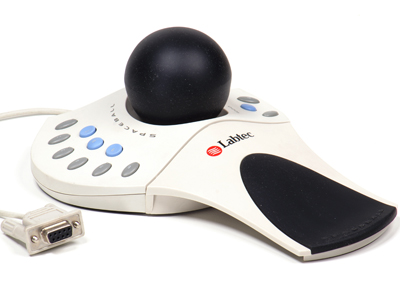Library to handle SpaceBall, SpaceMouse and SpaceOrb on serial port. Gets access to 3D rotation and translation vector as well as button status. (USB is not supported)
Library to handle SpaceBall, SpaceMouse and SpaceOrb on serial port. Gets access to 3D rotation and translation vector as well as button status. (USB is not supported)
All handling and decoding is done in the RX interrupt and the vector values can be read out asynchronously with different coordinate mappings.
Example:
#include "mbed.h"
#include "SpaceBall.h"
PwmOut led[] = {(LED1), (LED2), (LED3), (LED4) };
SpaceBall SBall(p9, p10); // tx, rx, bSOrb
int main() {
SBall.Init();
while(1) {
led[0] = abs( SBall[TX] ) + abs( SBall[TY] ) + abs( SBall[TZ] );
led[1] = abs( SBall[RX] );
led[2] = abs( SBall[RY] );
led[3] = abs( SBall[RZ] );
wait_us(500);
}
}
In this exaple the 4 LEDs are powered dependent on force at the Spaceball. LED1 shows the sum of all translation forces. LED2 to LED4 shows the rotation forces.
For more information about SpaceBall devices see manufactorers page http://www.3dconnexion.com
For connecting a SpaceBall (or SpaceMouse or SpaceOrb) to mbed see page wiki/Serial-Connection
Example: SpaceBall 4000

SpaceBall.h
- Committer:
- jocis
- Date:
- 2012-12-01
- Revision:
- 1:e6282b645d9b
- Parent:
- 0:f67a8fffd94a
- Child:
- 2:a7c0fcd157f7
File content as of revision 1:e6282b645d9b:
#include "mbed.h"
/* Spaceball Button bit-masks */
#define SBALL_BUTTON_1 0x0001 /* bit 0 */
#define SBALL_BUTTON_2 0x0002 /* bit 1 */
#define SBALL_BUTTON_3 0x0004 /* bit 2 */
#define SBALL_BUTTON_4 0x0008 /* bit 3 */
#define SBALL_BUTTON_5 0x0010 /* bit 4 */
#define SBALL_BUTTON_6 0x0020 /* bit 5 */
#define SBALL_BUTTON_7 0x0040 /* bit 6 */
#define SBALL_BUTTON_8 0x0080 /* bit 7 */
#define SBALL_BUTTON_9 0x0100 /* bit 8 */
#define SBALL_BUTTON_10 0x0200 /* bit 9 */
#define SBALL_BUTTON_11 0x0400 /* bit 10 */
#define SBALL_BUTTON_12 0x0800 /* bit 11 */
/* The Spaceball 3003 and 3003 FLX only have "left" and "right" buttons */
#define SBALL_BUTTON_RIGHT 0x1000 /* bit 12 */
#define SBALL_BUTTON_LEFT 0x2000 /* bit 13 */
/* The Spaceball 2003A and 2003B have a dedicated pick button on the ball */
/* The Spaceball 2003 FLX uses "button 9" as the pick button. */
/* All of them return this as "button 9" in their encoded button data */
#define SBALL_BUTTON_PICK SBALL_BUTTON_RIGHT /* bit 12 */
/* On Spaceball 2003A and 2003B, the Rezero is "button 8" on the device */
/* On the newer devices, there are dedicated rezero buttons */
#define SBALL_BUTTON_REZERO 0x4000 /* bit 14 */
/* The Spaceball 4000 FLX has a configurable palm rest which can be in */
/* either "left" or "right" handed mode. When it is configured in "left" */
/* handed mode, the "lefty" bit is set, and coordinate systems need to be */
/* inverted on one axis. */
#define SBALL_MODE_LEFTY 0x8000 /* bit 15 */
#define SPACEBALL_MAX_LENGTH 128
enum eSpaceBallAxis {
TX=0, TY, TZ,
Right=0, Forward, Up,
RX=3, RY, RZ,
Pitch=3, Roll, Yaw };
class SpaceBall {
public:
SpaceBall ( PinName tx, PinName rx, bool bSpaceOrb=false );
~SpaceBall() {};
void Init();
void GetTranslation ( float* fValue[3] ) const
{
*fValue[0] = GetAxis ( TX );
*fValue[1] = GetAxis ( TY );
*fValue[2] = GetAxis ( TZ );
}
void GetRotation ( float* fValue[3] ) const
{
*fValue[0] = GetAxis ( RX );
*fValue[1] = GetAxis ( RY );
*fValue[2] = GetAxis ( RZ );
}
float GetAxis ( int nAxis ) const
{
return GetAxisRaw ( nAxis ) * 0.00005f * _fScale;
}
int GetAxisRaw ( int nAxis ) const
{
if ( nAxis<0 || nAxis>5 )
return 0;
return m_axis[nAxis];
}
float operator[] (eSpaceBallAxis nAxis) const
{ return GetAxis ( nAxis ); }
float operator[] (int nAxis) const
{ return GetAxis ( nAxis ); }
int GetButtons() const
{
return m_buttons;
}
operator int (void) const
{ return GetButtons(); }
void SetScale ( float fScale=1.0f )
{ _fScale = fScale; }
float GetScale ( void )
{ return _fScale; }
protected:
Serial _serial;
bool _bSpaceOrb;
float _fScale;
int m_axis[6]; /* last translational data received */
//int m_rot[3]; /* last rotational data received */
int m_buttons; /* current button status */
void SerialISR(void);
void Process ( char c );
virtual void DoChangedAxis (void) {};
virtual void DoChangedButtons (void) {};
private:
unsigned char m_buf[256];
char m_resetstring[256];
int m_bufpos; /* current char position in packet buffer */
int m_packtype; /* what kind of packet is it */
int m_packlen; /* how many bytes do we ultimately expect? */
int m_escapedchar; /* if set, we're processing an escape sequence */
int m_erroroccured; /* if set, we've received an error packet or packets */
int m_resetoccured; /* if set, ball was reset, so have to reinitialize it */
int m_spaceball4000; /* if set, its a Spaceball 4000 */
int m_leftymode4000; /* if set, Spaceball 4000 in "lefty" orientation */
int m_timer; /* time since last packet was received */
bool _escape;
int _idx;
char _data[SPACEBALL_MAX_LENGTH];
void InitSB();
void InitSO();
void ProcessSB ( char c );
void ProcessSO ( char c );
void ProcessPacketSB ( void );
void ProcessPacketSO ( void );
};